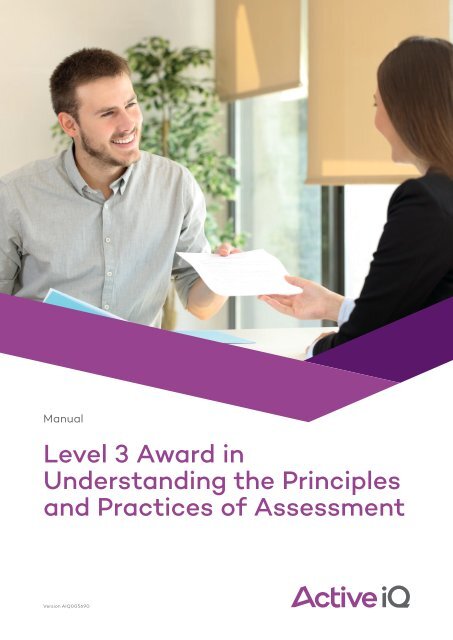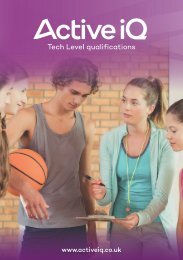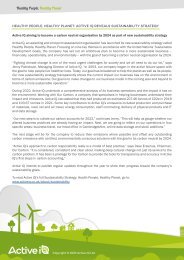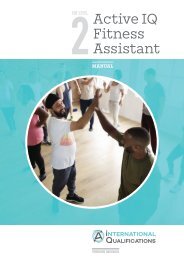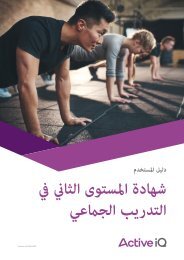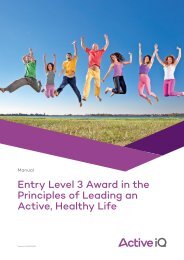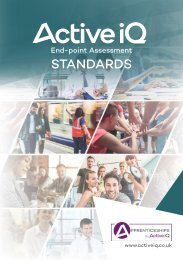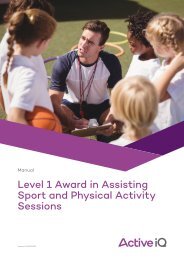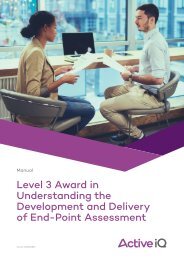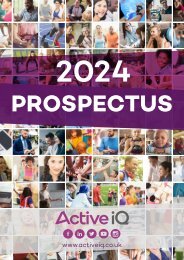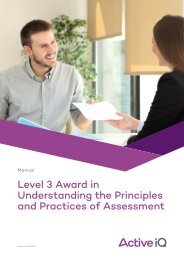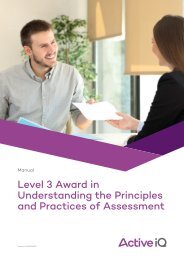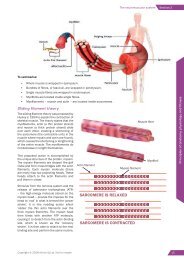Active IQ Level 3 Award in Assessing Vocationally Related Achievement (sample manual)
Create successful ePaper yourself
Turn your PDF publications into a flip-book with our unique Google optimized e-Paper software.
Manual<br />
<strong>Level</strong> 3 <strong>Award</strong> <strong>in</strong><br />
Understand<strong>in</strong>g the Pr<strong>in</strong>ciples<br />
and Practices of Assessment<br />
Version A<strong>IQ</strong>005690
Understand<strong>in</strong>g pr<strong>in</strong>ciples<br />
and practice of assessment<br />
<strong>in</strong> education and tra<strong>in</strong><strong>in</strong>g<br />
Aim<br />
This unit exam<strong>in</strong>es the theory beh<strong>in</strong>d assessment, and how it can be implemented <strong>in</strong> a variety of methods<br />
appropriate to the context of the environment, subject matter and type of learn<strong>in</strong>g. Assessors make judgements<br />
and decisions based on evidence; however, it is important for the learner and others to be <strong>in</strong>volved throughout. We<br />
will also consider responsibilities, policies, procedures and legislation related to the role and the whole process.<br />
Learn<strong>in</strong>g outcomes<br />
At the end of this unit you will:<br />
• Understand types and methods of assessment used <strong>in</strong> education and tra<strong>in</strong><strong>in</strong>g<br />
• Understand how to <strong>in</strong>volve learners and others <strong>in</strong> the assessment process<br />
• Understand the role and use of constructive feedback <strong>in</strong> the assessment process<br />
• Understand requirements for keep<strong>in</strong>g records of assessment <strong>in</strong> education and tra<strong>in</strong><strong>in</strong>g<br />
• Understand the pr<strong>in</strong>ciples and requirements of assessment<br />
• Understand different types of assessment method<br />
• Understand how to plan assessment<br />
• Understand how to make assessment decisions<br />
• Understand quality assurance of the assessment process<br />
• Understand how to manage <strong>in</strong>formation related to assessment<br />
• Understand the legal and good practice requirements<br />
<strong>in</strong> relation to assessment.<br />
Copyright © 2019 <strong>Active</strong> <strong>IQ</strong> Ltd. Not for resale<br />
1
The pr<strong>in</strong>ciples, legal and good practice requirements of assessment<br />
Section 1<br />
Section 1: The pr<strong>in</strong>ciples,<br />
legal and good practice<br />
requirements of assessment<br />
The purpose of assessment <strong>in</strong> learn<strong>in</strong>g and<br />
development: functions, concepts and pr<strong>in</strong>ciples<br />
Assessment is a purposeful process to f<strong>in</strong>d out if learn<strong>in</strong>g has taken place. It is a way to evidence whether a learner<br />
has the knowledge and skills required, usually aga<strong>in</strong>st a syllabus of criteria or expected standards. It is a supportive<br />
process where the learner is encouraged to ask questions, seek feedback and be <strong>in</strong>volved positively throughout.<br />
Assessment can serve the follow<strong>in</strong>g functions:<br />
Motivate and<br />
encourage learners<br />
Determ<strong>in</strong>e<br />
effectiveness of<br />
programme<br />
Diagnose learner<br />
needs<br />
Acknowledge and<br />
certificate learn<strong>in</strong>g<br />
Assist <strong>in</strong> selection<br />
processes<br />
The overall purpose of assessment is to determ<strong>in</strong>e whether a person is competent based on a range of evidence<br />
and set aga<strong>in</strong>st specified criteria. It helps establish whether the standards have been met and enables qualifications<br />
to be awarded.<br />
Understand<strong>in</strong>g pr<strong>in</strong>ciples and practice of assessment <strong>in</strong> education and tra<strong>in</strong><strong>in</strong>g<br />
The start<strong>in</strong>g po<strong>in</strong>t for any assessment is the programme outl<strong>in</strong>e, guide or qualification syllabus usually provided by<br />
the award<strong>in</strong>g organisation.<br />
<strong>Award</strong><strong>in</strong>g organisations (such as <strong>Active</strong> <strong>IQ</strong>) are responsible for produc<strong>in</strong>g the syllabus for a qualification, <strong>in</strong>clud<strong>in</strong>g<br />
an assessment specification. This will <strong>in</strong>clude how the qualification should be assessed; this may cover the format,<br />
frequency, qualifications required by the assessors, and systems for implement<strong>in</strong>g <strong>in</strong>ternal and external quality<br />
assurance.<br />
ACTIVITY<br />
F<strong>in</strong>d out who the award<strong>in</strong>g organisation is for your subject area. Access their website to f<strong>in</strong>d the<br />
specifications / syllabus for the qualifications they offer and review the assessment strategy along with<br />
the policies and procedures they have. Familiarise yourself with the requirements so that you can be<br />
prepared once you start work<strong>in</strong>g with an education and tra<strong>in</strong><strong>in</strong>g provider.<br />
Copyright © 2019 <strong>Active</strong> <strong>IQ</strong> Ltd. Not for resale 3
The pr<strong>in</strong>ciples, legal and good practice requirements of assessment<br />
Section 1<br />
Valu<strong>in</strong>g reflective practice and cont<strong>in</strong>u<strong>in</strong>g professional development<br />
Reflective practice is important for the assessor. It is th<strong>in</strong>k<strong>in</strong>g about (or reflect<strong>in</strong>g on) what you did or the experience<br />
you had and decid<strong>in</strong>g from that what you would do the same or differently next time.<br />
Reflective practice requires a conscious effort to th<strong>in</strong>k about the experience and develop future ideas. All <strong>in</strong>dividuals<br />
<strong>in</strong>volved <strong>in</strong> the learn<strong>in</strong>g and development process can benefit from it.<br />
Gravells’ (2011) EDAR approach provides a simple mechanism to follow for reflection:<br />
Experience<br />
Describe<br />
Analyse<br />
Revise<br />
Experience – the assessment you gave and would like to improve or reflect on<br />
Describe – who was <strong>in</strong>volved, what happened, when and where it happened<br />
Analyse – th<strong>in</strong>k more deeply, th<strong>in</strong>k how and why it happened<br />
Revise – what would you do differently? What would you keep the same? Try it out next time<br />
Follow<strong>in</strong>g this method can allow an assessor to reflect on their own assessment practice and identify areas they<br />
may wish to change. Assessors can reflect on their assessment experiences <strong>in</strong> a variety of ways <strong>in</strong>clud<strong>in</strong>g simple<br />
templates, notebooks, evaluation forms, self-reflection logs, learn<strong>in</strong>g logs or diaries.<br />
Cont<strong>in</strong>ual professional development (CPD) is a means by which assessors can ma<strong>in</strong>ta<strong>in</strong>, improve and broaden<br />
their knowledge, skills and assessment practice. This can be achieved <strong>in</strong> many ways, <strong>in</strong>clud<strong>in</strong>g attend<strong>in</strong>g workshops,<br />
onl<strong>in</strong>e tra<strong>in</strong><strong>in</strong>g, conferences, shadow<strong>in</strong>g, buddy<strong>in</strong>g, mentor<strong>in</strong>g others or tak<strong>in</strong>g further qualifications. With respect to<br />
assessment, CPD is vital as standards and qualifications change, regulations are amended, and subject knowledge<br />
and skills are constantly evolv<strong>in</strong>g. Without CPD, an assessor risks not be<strong>in</strong>g occupationally competent and be<strong>in</strong>g<br />
unable to perform their role. Most award<strong>in</strong>g organisations and tra<strong>in</strong><strong>in</strong>g providers will require evidence of regular CPD<br />
to ma<strong>in</strong>ta<strong>in</strong> the standards, licence or qualifications needed to assess.<br />
CPD:<br />
✓<br />
✓<br />
✓<br />
ACTIVITY<br />
Develops how to cope positively and confidently with assessment challenges and changes.<br />
Showcases assessors’ achievements and enhances credibility.<br />
Def<strong>in</strong>es, monitors and achieves career goals.<br />
Reflect on your current experience as a new assessor us<strong>in</strong>g the EDAR approach described above. Include<br />
the opportunities you will take over the com<strong>in</strong>g months to develop your knowledge, skills and practice.<br />
Notes<br />
Understand<strong>in</strong>g pr<strong>in</strong>ciples and practice of assessment <strong>in</strong> education and tra<strong>in</strong><strong>in</strong>g<br />
Copyright © 2019 <strong>Active</strong> <strong>IQ</strong> Ltd. Not for resale 11
Plann<strong>in</strong>g assessment<br />
Section 3<br />
Section 3: Plann<strong>in</strong>g assessment<br />
As with any aspect of learn<strong>in</strong>g and development provision, plann<strong>in</strong>g is essential <strong>in</strong> ensur<strong>in</strong>g a smooth, efficient and<br />
effective assessment process.<br />
To be effective, the assessment plan needs to consider the follow<strong>in</strong>g factors:<br />
Involv<strong>in</strong>g the learners Initial assessment Assessment method and type<br />
<strong>Award</strong><strong>in</strong>g organisation requirements<br />
Environmental conditions<br />
Date, time and duration Number and ability of learners Resources and materials<br />
Staff / support availability and expertise<br />
Did you know?<br />
Initial assessment can….<br />
Type of evidence required<br />
Help create an <strong>in</strong>dividual learn<strong>in</strong>g plan.<br />
Ensure learners are tak<strong>in</strong>g the right programme at the right level.<br />
Identify any specific support needs.<br />
Identify learn<strong>in</strong>g preferences.<br />
Inspire and motivate learners.<br />
Involve learners, giv<strong>in</strong>g them confidence to set their own targets.<br />
To be effective, an assessment plan should address the follow<strong>in</strong>g:<br />
Subject, qualification and specification<br />
1. The learner must be <strong>in</strong>volved <strong>in</strong> the plann<strong>in</strong>g of assessments and agree with the plan. They need to understand<br />
what is expected of them and be given the best opportunity for success.<br />
2. Plans must be clear and cover the required assessment criteria. They should show holistic assessment<br />
where possible.<br />
3. Plans should cover a variety of assessment methods which are appropriate for the criteria be<strong>in</strong>g assessed.<br />
4. Plans should <strong>in</strong>clude dates, times, actions that need complet<strong>in</strong>g, required resources, and details of others<br />
<strong>in</strong>volved <strong>in</strong> the process.<br />
Understand<strong>in</strong>g pr<strong>in</strong>ciples and practice of assessment <strong>in</strong> education and tra<strong>in</strong><strong>in</strong>g<br />
Copyright © 2019 <strong>Active</strong> <strong>IQ</strong> Ltd. Not for resale 17
Plann<strong>in</strong>g assessment<br />
Section 3<br />
Risks associated with assessment<br />
Environment: The assessor should consider the nature of<br />
the assessment environment such as appropriate heat<strong>in</strong>g,<br />
ventilation, light<strong>in</strong>g and fire exits, as well as more hazardous<br />
environments for practical environments such as gymnastics<br />
halls or swimm<strong>in</strong>g pools.<br />
Environment<br />
Assessment<br />
risks<br />
Activities: The assessor should pay attention to the<br />
complexity of the tasks such as the length of time taken,<br />
whether learners are sitt<strong>in</strong>g or stand<strong>in</strong>g, concentration<br />
levels required and duration <strong>in</strong> the environment. Low-risk<br />
tasks like written exams will pose less risk than complex<br />
practical tasks such as weightlift<strong>in</strong>g demonstrations or<br />
mix<strong>in</strong>g chemicals.<br />
Activities<br />
People<br />
Pressure<br />
People: This risk presents the largest variable and the one<br />
most difficult to control; what is low risk to one <strong>in</strong>dividual may be<br />
high risk to another. Age, fitness, gender and skill levels all pose<br />
a risk to physical or practical assessment, for example. More subtle<br />
differences, such as familiarity with an assessment environment, or the<br />
effect of assessment on stress, can also affect the assessment process. Other people <strong>in</strong>volved or exposed to the<br />
assessment process can pose a risk if known to the learner or assessor, or if roles and responsibilities are not<br />
clearly def<strong>in</strong>ed and understood.<br />
Pressure: Undue psychological pressure on the learner can risk affect<strong>in</strong>g the quality of the assessment process,<br />
such as assess<strong>in</strong>g an <strong>in</strong>dividual who is not yet ready, sett<strong>in</strong>g unrealistic timescales, not adapt<strong>in</strong>g to reasonable<br />
adjustments, special considerations or <strong>in</strong>dividual needs. Pressure can also affect the assessor, with high numbers<br />
of learners to assess, pressure to meet atta<strong>in</strong>ment targets or fund<strong>in</strong>g, or pressure from the learner’s employers.<br />
Effective<br />
communication<br />
Careful<br />
plann<strong>in</strong>g<br />
Situations that could pose a risk <strong>in</strong>clude:<br />
Lower risk<br />
• A lack of confidence <strong>in</strong> the assessor to make correct decisions.<br />
• A lack of standardisation activities across the assessor workforce.<br />
• A learner copy<strong>in</strong>g another’s work (plagiarism).<br />
• An assessor not consider<strong>in</strong>g a learner’s needs.<br />
• Us<strong>in</strong>g <strong>in</strong>appropriate assessment activities.<br />
• Assessors us<strong>in</strong>g lead<strong>in</strong>g questions or do<strong>in</strong>g the learners’ work for them.<br />
• <strong>Award</strong><strong>in</strong>g organisations prescrib<strong>in</strong>g unsuitable assessment methods.<br />
• Employers not be<strong>in</strong>g supportive of assessment <strong>in</strong> the workplace.<br />
• Unhelpful and negative feedback to the learner.<br />
• Favouritism or bias towards selected learners.<br />
• Learners not be<strong>in</strong>g registered with the award<strong>in</strong>g organisation prior to assessment.<br />
• Unwelcome disruptions and <strong>in</strong>terruptions when assess<strong>in</strong>g.<br />
Understand<strong>in</strong>g pr<strong>in</strong>ciples and practice of assessment <strong>in</strong> education and tra<strong>in</strong><strong>in</strong>g<br />
Copyright © 2019 <strong>Active</strong> <strong>IQ</strong> Ltd. Not for resale 19
Keep<strong>in</strong>g records and manag<strong>in</strong>g <strong>in</strong>formation<br />
Section 6<br />
Benefits of feedback<br />
Creates opportunities for clarification and further discussion<br />
Emphasises progress rather than failure<br />
Gives learners confidence and motivation<br />
Identifies further learn<strong>in</strong>g opportunities and actions<br />
Question<strong>in</strong>g<br />
Question<strong>in</strong>g provides a highly effective method for the learner’s journey and for the assessment process. It helps to<br />
establish whether the learner has the underp<strong>in</strong>n<strong>in</strong>g knowledge and understand<strong>in</strong>g of particular assessment criteria.<br />
The purpose of question<strong>in</strong>g is to allow your learner to consider their achievements and answers before it becomes<br />
assessor-led. Ask<strong>in</strong>g open and prob<strong>in</strong>g questions allows the learner to demonstrate their own knowledge, provide<br />
their own thoughts and <strong>in</strong>sight, and to reflect on what they feel they have achieved and why and how they feel they<br />
can cont<strong>in</strong>ue to improve.<br />
Top tips<br />
Top tips for question<strong>in</strong>g:<br />
1. Allow enough time.<br />
2. Ask open questions: who, what,<br />
where, why, when, how?<br />
3. Be aware of your postures, gestures<br />
and body language when ask<strong>in</strong>g<br />
questions and receiv<strong>in</strong>g responses.<br />
4. Be conscious of dialect, tone, pitch<br />
and volume of your voice.<br />
5. Don’t ask more than one question<br />
at a time.<br />
6. Involve everyone (nom<strong>in</strong>ated<br />
question<strong>in</strong>g) if <strong>in</strong> a group.<br />
7. Use active listen<strong>in</strong>g skills.<br />
8. Use eye contact and names.<br />
Understand<strong>in</strong>g pr<strong>in</strong>ciples and practice of assessment <strong>in</strong> education and tra<strong>in</strong><strong>in</strong>g<br />
9. Ma<strong>in</strong>ta<strong>in</strong> learners’ comfort zone by<br />
be<strong>in</strong>g <strong>in</strong> a separate room, or away<br />
from others, if appropriate.<br />
10. Watch and respond to your<br />
learners’ reactions.<br />
Copyright © 2019 <strong>Active</strong> <strong>IQ</strong> Ltd. Not for resale 29
THE PURPOSE OF ASSESSMENT<br />
Diganose<br />
learner needs<br />
Motivate and<br />
encourage<br />
learners<br />
Determ<strong>in</strong>e<br />
effectiveness<br />
of programme<br />
Assist <strong>in</strong><br />
selection<br />
processes<br />
Acknowledge<br />
and certificate<br />
learn<strong>in</strong>g<br />
RESPONSIBILITIES OF<br />
AN ASSESSOR<br />
Review of<br />
progress<br />
Initial<br />
assessment<br />
Assessment<br />
plann<strong>in</strong>g<br />
Assessment<br />
decision and<br />
feedback<br />
Assessment<br />
activity<br />
Copyright © 2019 <strong>Active</strong> <strong>IQ</strong> Ltd. Not for resale


